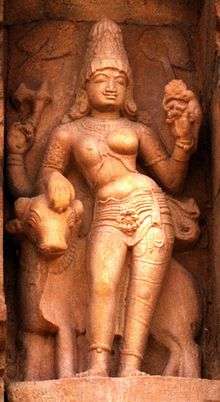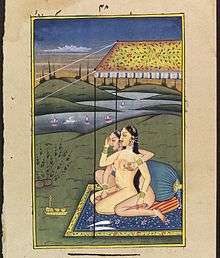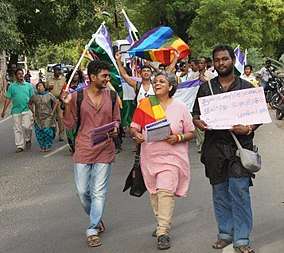LGBT history in India
LGBT in India has been documented for different times. In recent times the unbanning of homosexuality and promotion of LGBT rights has caused large amount of researches and opinions regarding the LGBT in India.


Ancient India
Ancient Indian texts are relevant to modern LGBT causes. Religion has played a role in shaping Indian customs and traditions. While injunctions on homosexuality's morality are not explicitly mentioned in the religious texts central to Hinduism, the largest religion in India, Hinduism has taken various positions on the topic, ranging from containing homosexual characters and themes in its texts to being neutral or antagonistic towards it. Rigveda, one of the four canonical sacred texts of Hinduism contains the phrase Vikriti Evam Prakriti (Sanskrit: विकृतिः एवम् प्रकृति, meaning what seems unnatural is also natural), which some scholars believe recognises homosexual/transsexual dimensions of human life, like all forms of universal diversities. The ancient Indian text Kamasutra written by Vātsyāyana dedicates a complete chapter on erotic homosexual behaviour.
The Arthashastra, an ancient Indian treatise on statecraft, mentions a wide variety of sexual practices which, whether performed with a man or a woman, were sought to be punished with the lowest grade of fine. While homosexual intercourse was not sanctioned, it was treated as a very minor offence, and several kinds of heterosexual intercourse were punished more severely.[1]
Sex between non-virgin women incurred a small fine, while homosexual intercourse between men could be made up for merely with a bath with one's clothes on, and a penance of "eating the five products of the cow and keeping a one-night fast" – the penance being a replacement of the traditional concept of homosexual intercourse resulting in a loss of caste.[1]
Medieval period
Homosexuality and pederasty was rare in medieval Hindu society with Al-Biruni saying that Hindus greatly disapproved of it. Under the Muslim rule, this grew more common with the sultans of the Delhi Sultanate themselves establishing relationships with men despite the prohibitions against it in Sharia.[2][3]
Mughal Empire
The biography of Sarmad Kashani published by caretakers of his shrine states that he had fallen for a Hindu boy named Abhai Chand whose father eventually relented and allowed them to be together.[4]
Urdu poetry of the late medieval era used the term "chapti" to refer to sex between people of same genders. "Amarad Parast" referred to those with preference for young males.[5]
The Dutch traveler Johan Stavorinus reported about male homosexuality among Mughals living in Bengal, "The sin of Sodom is not only universal in practice among them, but extends to a bestial communication with brutes, and in particular, sheep. Women even abandon themselves to the commission of unnatural crimes."[6][7]
British Colonial period (1858-1947 CE)

The British Raj criminalized sexual activities "against the order of nature", including homosexual sexual activities, under Section 377 of the Indian Penal Code, which entered into force in 1861. It was similarly instituted throughout most of the British Empire due to the Christian religious beliefs of the British colonial governments. The Goa Inquisition prosecuted the capital crime of sodomy in Portuguese India,[8][9]
Republic of India (c. 1947 CE - present)
In 1977 Shakuntala Devi published the first[10] study of homosexuality in India.[11][12] Whilst convictions under Section 377 were rare, with no convictions at all for homosexual intercourse in the twenty years to 2009, Human Rights Watch have said that the law was used to harass HIV/AIDS prevention activists, as well as sex workers, men who have sex with men, and other LGBT groups.[13] The group documents arrests in Lucknow of four men in 2006 and another four in 2001.
Homosexual intercourse was a criminal offence from the introduction of Section 377 of the Indian Penal Code in 1860 until the Delhi High Court's 2009 decision in Naz Foundation v. Govt. of NCT of Delhi.[14] After the Delhi court's ruling was overturned in 2013, homosexual intercourse was re-criminalized until the Supreme Court of India's 2018 ruling in Navtej Singh Johar v. Union of India. This made it an offence for a person to voluntarily have "carnal intercourse against the order of nature."
2009-2013

This law was struck down by the 2009 Delhi High Court decision Naz Foundation v. Govt. of NCT of Delhi, which found Section 377 and other legal prohibitions against same-sex conduct to be in direct violation of fundamental rights provided by the Indian Constitution.
Decisions of a High Court on the constitutionality of law (i.e. judicial review) apply throughout India, and not just to the territory of the state over which the High Court in question has jurisdiction.[16] However, even after the pronouncement of verdict, there have been (rare) incidents of harassment of homosexual groups.[17]
On 16 February 2012, the Supreme Court, during a hearing of a bunch of appeals filed against decriminalisation of gay sex, observed that homosexuality should be seen in the context of changing society as many things which were earlier unacceptable have become acceptable with the passage of time.
The two-judge bench, composed of Justices G S Singhvi and S J Mukhopadhaya, opined that homosexuality should be seen in the light of changing times where phenomena of live-in relationship, single parents and artificial fertilisation have become normal. They had also pointed out that many things, which were considered immoral 20 years ago, have become acceptable to society now. The bench said that gay sex was not an offence prior to 1860 and referred to paintings and sculptures of Khajuraho. Senior Advocate Amrendra Sharan, who opposed the Delhi High Court order of decriminalising gay sex on behalf of the Delhi Commission for Protection of Child Rights, had then submitted that social issues cannot be decided on the basis of sculptures. The apex court bench, however, observed that it is a reflection of society of that time and homosexuality should not be seen only in terms of sexual intercourse. Earlier, the Supreme Court bench had asked the anti-gay rights groups, challenging legalisation of gay sex to explain how such acts are against the order of nature as submitted by them. The apex court was hearing petitions filed by anti-gay rights activists and also by political, social and religious organisations which have opposed the Delhi High Court verdict decriminalising homosexual behaviour.
However, on 23 February 2012, the Union Home Ministry of the UPA government replying to a Supreme Court observation, told the Supreme Court that it was opposed to the decriminalisation of gay sex. "This is highly immoral and against the social order," the Home Ministry told the apex court. It said that India's moral and social values were different from other countries, and therefore, the nation should not be guided by them.[18] The Central Government reversed its stand on 28 February 2012, asserting that there was no error in decriminalising gay sex. This resulted in the SC pulling up the Centre for frequently changing its stand on the issue. Don't make a mockery of the system and don't waste the court's time, an apex court judge told the government.[19]
Also in 2012, a guide titled 'Creating Inclusive Workplaces for LGBT Employees in India' was developed by IBM, Goldman Sachs, Google together with Community Business, a non-profit organization.[20]
In December 2013, however, India's top court upheld the law that criminalises gay sex, in a ruling that reverses a landmark 2009 Delhi High Court order which had decriminalised homosexual acts. The court said it was up to parliament to legislate on the issue.
Indians have traditionally interpreted Section 377, a 153-year-old colonial-era law, as condemning a same-sex relationship as an "unnatural offence", and also considering it punishable by a 10-year jail term. Political, social and religious groups petitioned the Supreme Court to have the law reinstated in the wake of the 2009 court ruling.[21][22]
2013-present
The protests against the reinstitution of Section 377 took place across India, and resulted in political activism across political parties to declare their support for the law's repeal. By April 2014, the month of the upcoming election, at least three major political parties - the Aam Aadmi Party, the Congress and the Communist Party of India (Marxist) - had included support for decriminalization of homosexual relations in their election manifestos,.[23]
In July 2014 first book on Genderqueer in Tamil and first Tamil book on LGBTQIA was from Srishti Madurai was released by BJP’s state general secretary, Vanathi Srinivasan, at the 6th Hindu spiritual service foundation’s sixth service fair, Chennai.[24][25][26]
In June 2016, a dating platform called Amour Queer Dating was launched in India, for LGBTIQ people seeking long term companions.[27][28] In May 2017 the first Bhopal Pride March was conducted, gathering the participation of around 200 members.
On 6 September 2018 the Supreme Court of India invalidated part of Section 377 of the Indian Penal Code making homosexuality legal in India.[29] In striking down the colonial-era law that made gay sex punishable by up to 10 years in prison, one judge said the landmark decision would "pave the way for a better future."[30]
See also
- Timeline of South Asian and diasporic LGBT and queer history
- Kolkata Rainbow Pride Walk
References
- Vanita & Kidwai 2001, p. 25
- Eraly, Abraham (Apr 1, 2015). The Age of Wrath: A History of the Delhi Sultanate. Penguin UK. ISBN 9789351186588. Retrieved Aug 15, 2019 – via Google Books.
- Vanita, Ruth (Oct 20, 2008). Same-Sex Love in India. Penguin Books Limited. ISBN 9788184759693. Retrieved Aug 15, 2019 – via Google Books.
- Vanita, Ruth (Oct 20, 2008). Same-Sex Love in India. Penguin Books Limited. ISBN 9788184759693. Retrieved Aug 15, 2019 – via Google Books.
- Sondy, Amanullah De (Nov 7, 2013). The Crisis of Islamic Masculinities. A&C Black. ISBN 9781780936932. Retrieved Aug 15, 2019 – via Google Books.
- [Johan Stavorinus, Voyages to the East Indies, G G. Robinson (London), 1798, pp. 455-56. Cited in Grcenberg, p. 180.]
- Greenberg, David F. (Oct 29, 2008). The Construction of Homosexuality. University of Chicago Press. ISBN 9780226219813. Retrieved Aug 15, 2019 – via Google Books.
- "Xavier was aware of the brutality of the Inquisition". Deccan Herald. Deccan Herald. 27 April 2010. Retrieved 18 September 2017.
- Sharma, Jai. "The Portuguese Inquisition in Goa: A brief history". Indiafacts.org. Retrieved 18 September 2017.
- Subir K Kole (2007-07-11). "Globalizing queer? AIDS, homophobia and the politics of sexual identity in India". Globalization and Health. 3: 8. doi:10.1186/1744-8603-3-8. PMC 2018684. PMID 17623106.: "The first academic book on Indian homosexuals appeared in 1977 (The World of Homosexuals) written by Shakuntala Devi, the mathematics wizkid who was internationally known as the human computer. This book treated homosexuality in a positive light and reviewed socio-cultural and legal situation of homosexuality in India and contrasted that with the then gay liberation movement in USA."
- Shakuntala Devi (1977). The World of Homosexuals. Vikas Publishing House. ISBN 9780706904789.
- Jeffrey S. Siker (2006). Homosexuality and Religion. Greenwood Publishing Group. p. 127. ISBN 9780313330889.: "In her 1977 book, mathematician Shakuntala Devi interviewed..."
- "India: Repeal Colonial-Era Sodomy Law". Human Rights Watch. January 11, 2006. Archived from the original on April 13, 2008. Retrieved March 3, 2020.
- "Where is it illegal to be gay?". BBC News. 10 February 2014. Retrieved 11 February 2014.
- "One Who Fights For an Other". The New Indian Express.
- Kusum Ingots v. Union of India, (2004) 6 SCC 254: "An order passed on a writ petition questioning the constitutionality of a Parliamentary Act, whether interim or final, keeping in view the provisions contained in Clause (2) of Article 226 of the Constitution of India, will have effect throughout the territory of India subject of course to the applicability of the Act."
- Pervez Iqbal Siddiqui (28 December 2010). "Crackdown on gay party in Saharanpur, 13 held". The Times of India. Retrieved 20 January 2011.
- http://www.mumbaimirror.com/article/3/2012022320120223141327934d025428/Homosexuality-Govt-opposes-HC-verdict-in-apex-court.html%5B%5D
- "Supreme Court pulls up Centre for flip-flop on homosexuality - Indian Express". archive.indianexpress.com. Retrieved Aug 15, 2019.
- "Lesbian, gay, bisexual and transgender resource guide for employers - The Times of India". The Times Of India.
- "India top court reinstates gay sex ban". BBC News. 11 December 2013.
- The text of the law actually reads, "Unnatural offences.--Whoever voluntarily has carnal intercourse against the order of nature with any man, woman or animal, shall be punished with 1*[imprisonment for life], or with imprisonment of either description for a term which may extend to ten years, and shall also be liable to fine. Explanation.-Penetration is sufficient to constitute the carnal intercourse necessary to the offence described in this section. " See "Archived copy" (PDF). Archived from the original (PDF) on 2014-02-11. Retrieved 2013-12-11.CS1 maint: archived copy as title (link).
- "Manifestos bring hope to lesbians, gays et al (Election Special)". Mar 28, 2014. Retrieved Aug 15, 2019 – via Business Standard.
- "It's a great honour to be awarded for book on gender variants: Gopi Shankar | Madurai News - Times of India". The Times of India. Retrieved Aug 15, 2019.
- http://www.asianage.com/india/bjp-supports-tn-leader-book-lgbt-157
- "BJP leader launches LGBT rights book in TN". Mumbai Mirror. Retrieved Aug 15, 2019.
- "Amour - A dating platform for Queer". amourqueerdating.blogspot.in. Retrieved Aug 15, 2019.
- "GetSocial". scl.io. Retrieved Aug 15, 2019.
- Rautray, Samanwaya (6 September 2018). "Section 377: SC rewrites history, homosexual behaviour no longer a crime". The Economic Times. Retrieved 6 September 2018.
- "India's Supreme Court strikes down law that punished gay sex". ABC News. Archived from the original on 6 September 2018. Retrieved 6 September 2018.